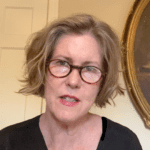Last spring, when I got an out-of-the-blue email from Cindy Cheng informing me that I had won the 2020 SWIPE Mentor award, I was delighted—but also rather surprised. Reading through the extraordinarily moving nominations, I remembering thinking to myself: “Really? I am getting an award for simply acting like a human being?”
I embrace the honor whole-heartedly—but here’s the thing: I rarely consciously think about mentoring (which makes this piece rather challenging to write). The activities and attributes that the nominators described were simply the things that provide me with happiness and ultimately make life meaningful to me. Mentoring is not a separate activity, or career box to check off. Instead, it is something inherently satisfying as part of my everyday life: a chance to connect in a deep way, to learn from others who come from a different perspective, and to observe people rising to their awe-inspiring potential. It honestly gives me as much as it seems to have given others—so, I am doubly grateful for this recognition, as it is so unnecessary.
Reflecting on my experience over the past couple of decades, I realized that there might be a couple lessons from my life as an “accidental mentor.” I have no illusions that there is a one size fits all way to mentor—or be mentored. Yet I hope that these lessons can create the space for all our colleagues and students to flourish. In so doing, we will take one step further toward a more inclusive and diverse scholarly community. In addition to being normatively necessary, diversity also means our knowledge will encompass all the dynamics of political life, not just those obvious within our own narrow worlds. Ultimately, for me, this produces a professional experience that is inherently more interesting and enjoyable, as well as being much more likely to provide us with the full range of theories and tools we need to address the challenges we face.
So, two modest proposals for how to mentor: model who you really are, and celebrate the commonality across all of us.
Model Who You Really Are
Mentoring starts with how we ourselves act and move through our shared academic world. In my very first years as an Assistant Professor, young scholars and graduate students would often come up to talk with me after a panel presentation. They wanted to engage with me not just about the politics of the euro or the role of ideas in policymaking, but also about my experience as a young mother in the academy, or about my willingness to publicly skewer certain types of narrow norms in IPE scholarship, or about my conversational and accessible presenting style.
What this highlights for me is that we are performing our identities all the time. The more that each of us, particularly those in positions of relative power, can be honest and open about our own diverse identities, the more space we create for others to do the same. We can be impressively professional and model an unapologetic embrace of who we are—but for this to work, it is entirely dependent on each of us doing so, so as to expand our definition of what professional and accomplished looks like. For me, most centrally, and challengingly, that initially meant (20 odd years ago) learning to be comfortable presenting myself as a mother and a scholar—but it also has meant simple things like being honest about my love of my non-academic (and stereotypically female) activities, be it yoga or gardening, or watching The Great British Baking Show. My own pantheon of role models for this ability to project your whole self includes women like Marty Finnemore and Kathy Thelen. They have always let their brilliance and achievements coexist alongside a sense of warmth and humanity, being full and complete persons alongside their professional bad-assery.
Diversity is a fact—but our profession often ignores it and sometimes dominant norms seem to demand that we underplay it. We must all be brave enough to push the boundaries of what we think are the norms around how we present ourselves to the world to demonstrate our inherent diversity and, in so doing, decenter the notion of professorial excellence as only looking like John Housman’s tweedy white law professor in The Paper Chase. Countless studies have shown that diversity brings excellence in performance across a multitude of metrics. For us scholars, diversity is critical to ensuring that we can look at the nature of political life in ways that can capture the broad spectrum of dynamics at work. To do otherwise is to skew our intellectual inquiries away from a more complete understanding.
Find the Common Nerd in All of Us
Diversity is a fact, but inclusion is a practice. Even as we model diverse identities as scholars and teachers, we also need to find ways to extend out a sense of common belonging so that all can be welcome to contribute to our profession. My hunch is that we need to find a sense of common humanity, the thing that binds us together whatever our gender identity, race, ethnicity, class, nationality, or ability status. And, forgive me, what I see as the thing that draws us together as political scientists is what might be called the common nerd in all of us. If we can share our commonality as human beings in all stripes and sizes with an overarching, shared identity (as nerds) and shared purpose (figuring how political life works), there might not be as much of a sense of loneliness and need for things like code-switching and adherence to dominant (white, male, elite) norms at APSA panels and workshops and faculty meetings.
Marginalization occurs because of entrenched institutional power that promotes some groups over others. Much work remains to be done to ensure that diversity occurs across universities, journals, conference panels, and policy debates. But everyday practices and the culture that is generated from them can play a role in the creation of a more inclusive academy. Celebrating the natural co-existence of both our shared commonality as nerds and our inherent diversity as people is one way to draw us together while allowing difference and variation in who we are. In my own life, I have found it remarkably easy to connect with colleagues inside and outside of Georgetown simply by focusing on our shared interests as teachers and scholars, rather than our differences in age, nationality, ethnicity, temperament, or for that matter, theoretical or methodological approach. Recently, I was honored to be asked to deliver a keynote presentation at a workshop for young IPE scholars organized by Professor Julia Gray, and experienced firsthand the excitement and gratification that comes from engaging across perspectives around a common set of questions—while hopefully providing each of the junior colleagues there with a sense of value and worth that they more than deserve.
In the end, we can be the most innovative and bold, paradoxically, when we feel the most safe. I hope that we can collectively learn to mentor in ways that allow us to all feel safe being exactly who we are, and to celebrate our common humanity and our common love for puzzling out how politics works. That is the best way to effect long lasting change in a world that very much needs it.
This piece is the coda to a mini-forum honoring Kate as recipient of the Society for Women in International Political Economy (SWIPE) 2020 Mentor Award and follows posts written by Naazneen Barma, Diana Kim, Ji-Young Lee, and Tana Johnson on the Bridging the Gap channel. — The BtG Editors.



0 Comments
Trackbacks/Pingbacks